Related Reading
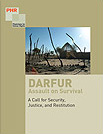 |
Darfur: Assault on Survival: A Call for Security, Justice, and Restitution
Physicians for Human Rights, Karen Hirschfeld co-author
For over two years, the Government of Sudan and their ruthless proxy militias, the Janjaweed, have carried out a systematic campaign of
destruction against specific population groups, their way of life and all that sustains them. This report by OSI grantee Physicians for
Human Rights tells the story of Darfurian lives and livelihoods obliterated in three of the thousands of villages literally wiped off the
map by the genocidal killers who also pillaged, plundered, and pursued men, women and children in an all-out assault on the very survival
of a population.
By delving deeply into the experiences and accounts of eyewitnesses from the villages of Furawiya, Terbeba, and Bendisi, Physicians for
Human Rights is adding to the mounting evidence of war crimes, crimes against humanity and genocide perpetrated against non-Arab civilians
in Darfur. During trips to the region between May 2004 and July 2005, investigators randomly surveyed dozens of survivors and documented--with
hundreds of photographic images as well as hand-drawn maps--compelling evidence of a destroyed way of life and means of survival.
Download (PDF document)
Open Society Institute Report

|
 |
Economic Development of Southern Sudan
Benaiah Yongo-Bure
Economic Development of Southern Sudan provides an overview of the Southern Sudanese economy, and the main
causes for the lack of development in the territory. The book suggests strategies and policies for greatly reducing
poverty and initiating sustainable development in the territory.
Yongo-Bure outlines the significance of the resource base of Southern Sudan, as well as the development programs of
the first peace period (1972--1983). The prominent sectors analyzed include agriculture, industry, transport,
education, health, energy, power, and trade. The exploration and exploitation of petroleum is highlighted.
ISBN: 0761835881 (hardcover)
Barnes & Noble
Borders/Amazon
ISBN: 076183589X (paperback)
Barnes & Noble
Borders/Amazon

|
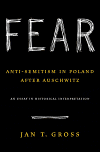 |
Fear: Anti-Semitism after Auschwitz
Jan T. Gross
Poland suffered an exceedingly brutal Nazi occupation during the Second World War. Close to five million Polish citizens
lost their lives as a result. More than half the casualties were Polish Jews. Thus, the second largest Jewish community in
the world- only American Jewry numbered more than the three and a half million Polish Jews at the time- was wiped out.
Over 90 percent of its members were killed in the Holocaust. And yet, despite this unprecedented calamity that affected both
Jews and non-Jews, Jewish Holocaust survivors returning to their hometowns in Poland after the war experienced widespread
hostility, including murder, at the hands of their neighbors. The bloodiest peacetime pogrom in twentieth-century Europe took
place in the Polish town of Kielce one year after the war ended, on July 4, 1946.
Jan Gross's Fear attempts to answer a perplexing question: How was anti-Semitism possible in Poland after the war?
At the center of his investigation is a detailed reconstruction of the Kielce pogrom and the reactions it evoked in various
milieus of Polish society. How did the Polish Catholic Church, Communist party workers, and intellectuals respond to the
spectacle of Jews being murdered by their fellow citizens in a country that had just been liberated from a five-year Nazi
occupation?
Gross argues that the anti-Semitism displayed in Poland in the war's aftermath cannot be understood simply as a continuation
of prewar attitudes. Rather, it developed in the context of the Holocaust and the Communist takeover: Anti-Semitism
eventually became a common currency between the Communist regime and a society in which many had joined in the Nazi campaign
of plunderand murder- and for whom the Jewish survivors were a standing reproach.
Jews did not bring communism to Poland as some believe; in fact, they were finally driven out of Poland under the
Communist regime as a matter of political expediency. In the words of the Nobel Prize-winning poet Czeslaw Milosz,
Poland's Communist rulers fulfilled the dream of Polish nationalists by bringing into existence an ethnically pure state.
For more than half a century, what happened to the Jewish Holocaust survivors in Poland has been cloaked in guilt and shame.
Writing with passion, brilliance, and fierce clarity, Jan T. Gross at last brings the truth to light.
ISBN: 0375509240 (hardcover)
Barnes & Noble
Borders/Amazon

|
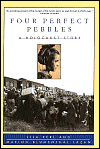 |
Four Perfect Pebbles: A Holocaust Story
Lila Perl, Marion Blumenthal Lazan
If she could find four perfect pebbles of almost exactly the same size and shape, it meant that her family would remain
whole. Mama and papa and she and Albert would survive Bergen-Belsen. The four of them might even survive the Nazis' attempt
to destroy every last Jew in Europe.
Kirkus Reviews:
By the time WW II ended in Europe, the Blumenthal family--Marion, her brother Albert, and their parents--had
lived in a succession of refugee, transit, and prison camps for more than six years, not only surviving but staying together,
a phenomenon that Marion attributes to the power of her four lucky stones. After trying on several occasions to leave Europe,
and after being shunted from camp to camp, they arrived in Bergen-Belsen, where conditions were so bad that nearly half the
camp's population died of disease, starvation, exposure, exhaustion, and brutal beatings. Two weeks before the advancing
Russian army reaches the camp, the Blumenthals suffered another terrible blow; they were bundled onto a train bound for
Auschwitz. Only because the train was unaccountably delayed were its passengers found by the Russians and freed.
This gripping memoir is written in spare, powerful prose that vividly depicts the endless degradation and humiliation
suffered by the Holocaust's innocent victims, as well as the unending horror of life in the camps.
It's also an ennobling account of the triumph of the human spirit, as seen through a child's eyes.
ISBN: 068814294X (hardcover)
Barnes & Noble
Borders/Amazon
ISBN: 0380731886 (paperback)
Barnes & Noble
Borders/Amazon

|
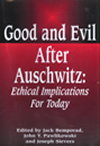 |
Good and Evil After Auschwitz: Ethical Implications for Today
Jack Bemporad
Good and Evil After Auschwitz is a compendium of the papers presented at an extraordinary symposium convened at the Vatican in 1998.
It represents the views of more than 30 of the world's foremost theologians and religious thinkers on the inescapable moral question of our
era, the problem of how, if at all, believers can reconcile their faith in a just and merciful God with the mass murder of millions of
innocents during the Holocaust. Although the symposium took place in the Vatican, it gave voice to the thought and anguish of Jewish and
Protestant thinkers as well as Roman Catholics, for its organizers understood that the issue with which they wished to grapple was of
compelling interest to members of all faith communities. Similarly, the participants came from many different countries, for these
issues are of worldwide concern and are troubling for people everywhere. In addition to leading American scholars who have written
extensively on the Holocaust, the participants include many individuals well known in European intellectual and philosophical circles.
The volume includes an interview with Marek Edelman, the last surviving leader of the Warsaw Ghetto uprising, and excerpts from the writings
of Moshe Flinker, Etty Hillesum, and Dietrich Bonhoeffer. Good and Evil After Auschwitz is a powerful and thought-provoking book.
The profoundly moving contributions by the symposium participants can serve as signposts to guide us in the effort to confront the
awesome questions posed by the Holocaust, even as they remind us that no human answer can possibly be adequate to its enormity.
ISBN: 0881256927 (paperback)
Barnes & Noble
Borders/Amazon

|
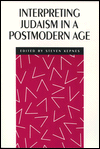 |
Interpreting Judaism in a Postmodern Age
Steven Kepnes ed.
Postmodernity marks a time of creative conflict when the voices of the other, previously rendered silent by the majority,
are prominently heard. What effect has postmodernism had on Judaism?
The neat narratives and metanarratives of the Jewish past are being questioned and deconstructed, allowing for
different versions of Jewish history to emerge. For example, a postmodern exploration of the place of women in
Talmudic culture can upset portraits of women as powerless and rabbis as closed off to female experience thereby
helping to secure a place for women today. Similarly, an analysis of Zionism using concepts drawn from postmodern
thinkers problematizes such basic Zionists concepts as nation, exile, and normalization, and raises significant questions
concerning the relationship of Israel and the diaspora.
The twelve contributors, including Daniel Boyarin, Elliot R. Wolfson, and Laurence J. Silberstein, shed new
light on the central texts and issues of Judaism through their postmodern interpretations.
They offer up provocative perspectives on Bible and Midrash; Talmud and Halakhah; Kabbalah; Zionism; the Holocaust;
feminism; literature; pedagogy; and liturgy.
ISBN: 0814746748 (hardcover)
Barnes & Noble
Borders/Amazon
ISBN: 0814746756 (paperback)
Barnes & Noble
Borders/Amazon

|
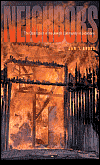 |
Neighbors: The Destruction of the Jewish Community in Jedwabne, Poland
Jan T. Gross
One summer day in 1941, half of the Polish town of Jedwabne murdered the other half--1600 men, women, and children--all but
seven of the town's Jews. Neighbors tells their story.
This is a shocking, brutal story that has never before been told. It is the most important study of Polish-Jewish relations
to be published in decades and should become a classic of Holocaust literature.
Jan Gross pieces together eyewitness accounts and other evidence into an engulfing reconstruction of the horrific
July day remembered well by locals but forgotten by history. His investigation reads like a detective story, and its
unfolding yields wider truths about Jewish-Polish relations, the Holocaust, and human responses to occupation and
totalitarianism. It is a story of surprises: The newly occupying German army did not compel the massacre, and Jedwabne's
Jews and Christians had previously enjoyed cordial relations. After the war, the nearby family who saved Jedwabne's surviving
Jews was derided and driven from the area. The single Jew offered mercy by the town declined it.
Most arresting is the sinking realization that Jedwabne's Jews were clubbed, drowned, gutted, and burned not by faceless
Nazis, but by people whose features and names they knew well: their former schoolmates and those who sold them food, bought
their milk, and chatted with them in the street. As much as such a question can ever be answered, Neighbors tells us why.
In many ways, this is a simple book. It is easy to read in a single sitting--and hard not to. But its simplicity is deceptive.
Gross's new and persuasive answers to vexed questions rewrite the history of twentieth-century Poland. This book proves,
finally, that the fates of Poles and Jews during World War II can be comprehended only together.
ISBN: 0691086672 (hardcover)
Barnes & Noble
Borders/Amazon
ISBN: 0142002402 (paperback)
Barnes & Noble
Borders/Amazon

|
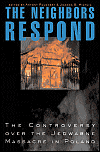 |
The Neighbors Respond: The Controversy over the Jedwabne Massacre in Poland
Antony Polonsky (Editor), Joanna B. (Eds.) Michlic, Joanna B. Michlic (Editor)
Neighbors--Jan Gross's stunning account of the brutal mass murder of the Jews of Jedwabne by their Polish
neighbors--was met with international critical acclaim and was a finalist for the National Book Award in the United States.
It has also been, from the moment of its publication, the occasion of intense controversy and painful reckoning.
This book captures some of the most important voices in the ensuing debate, including those of residents of Jedwabne itself
as well as those of journalists, intellectuals, politicians, Catholic clergy, and historians both within and well
beyond Poland's borders.
Antony Polonsky and Joanna Michlic introduce the debate, focusing particularly on how Neighbors rubbed against
difficult old and new issues of Polish social memory and national identity. The editors then present a variety of Polish
voices grappling with the role of the massacre and of Polish-Jewish relations in Polish history.
They include samples of the various strategies used by Polish intellectuals and political elites as they have
attempted to deal with their country's dark past, to overcome the legacy of the Holocaust, and to respond to Gross's book.
The Neighbors Respond makes the debate over Neighbors available to an English-speaking audience--and
is an excellent tool for bringing the discussion into the classroom. It constitutes an engrossing contribution to
modern Jewish history, to our understanding of Polish modern history and identity, and to our bank of Holocaust memory.
ISBN: 0691113068 (paperback)
Barnes & Noble
Borders/Amazon

|
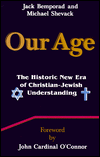 |
Our Age: The Historic New Era of Christian-Jewish Understanding
Jack Bemporad, Michael Shevack
We live in a period of sharp contrasts, but if we look closely we can see that ours is an age of peace, understanding and love between
all faiths and peoples. This is the message of Our Age as it focuses on the dramatic historical change in Jewish-Catholic understanding.
Library Journal review:
In 1990, Rabbi Bemporad negotiated the controversial relocation of the Carmelite Convent in Auschwitz, Poland.
He and his student and colleague Rabbi Shevack (Stupid Ways, Smart Ways To Think About God, Triumph, 1993) have now produced a clear,
easy-to-read examination of the new age in interreligious affairs ushered in over 30 years ago with Vatican II and the "Nostra Aetate"
proclamation, which acknowledged Christianity's Jewish roots, deplored anti-Semitism, and sought to build bridges between the two religions.
It was, in the words of Bemporad and Shevack, "a breakthrough-the first doctrinal statement in history that goes hand-in-hand with a warm,
respectful, loving presentation of Jews and Judaism." The authors touch on the text, issues, and controversies surrounding Jesus,
the Christian Gospels, and the Jewish people. Most important, they examine developments since the "Nostra Aetate."
They also discuss the great efforts of John Paul II to further the work of understanding.
Their brief, readable, affordable study is recommended for most public libraries. —Paul Kaplan, Lake Villa District Lib., Ill.
ISBN: 1565480813 (paperback)
Barnes & Noble
Borders/Amazon

|
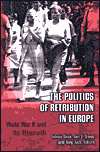 |
The Politics of Retribution in Europe: World War II and Its Aftermath
Istvan Deak (Editor), Jan T. Gross (Editor), Tony Judt (Editor)
The presentation of Europe's immediate historical past has quite dramatically changed. Conventional depictions of occupation and
collaboration in World War II, of wartime resistance and post-war renewal, provided the familiar backdrop against which the chronicle
of post-war Europe has mostly been told.
Within these often ritualistic presentations, it was possible to conceal the fact that not only were the majority of people in
Hitler's Europe not resistance fighters but millions actively co-operated with and many millions more rather easily accommodated to Nazi rule.
Moreover, after the war, those who judged former collaborators were sometimes themselves former collaborators. Many people became innocent
victims of retribution, while others--among them notorious war criminals--escaped punishment.
Nonetheless, the process of retribution was not useless but rather a historically unique effort to purify the continent of the many sins
Europeans had committed. This book sheds light on the collective amnesia that overtook European governments and peoples regarding their
own responsibility for war crimes and crimes against humanity--an amnesia that has only recently begun to dissipate as a result of often
painful searching across the continent.
In inspiring essays, a group of internationally renowned scholars unravels the moral and political choices facing European governments
in the war's aftermath: how to punish the guilty, how to decide who was guilty of what, how to convert often unspeakable and conflicted
war experiences and memories into serviceable, even uplifting accounts of national history.
In short, these scholars explore how the drama of the immediate past was (and was not) successfully "overcome."
Through their comparative and transnational emphasis, they also illuminate the division between eastern and western Europe,
locating its origins both in the war and in post-war domestic and international affairs. Here, as in their discussion of collaborators'
trials, the authors lay bare the roots of the many unresolved and painful memories clouding present-day Europe.
Contributors are Brad Abrams, Martin Conway, Sarah Farmer, Luc Huyse, Lászlo Karsai, Mark Mazower, and Peter Romijn, as well as the editors.
Taken separately, their essays are significant contributions to the contemporary history of several European countries.
Taken together, they represent an original and pathbreaking account of a formative moment in the shaping of Europe at the dawn of a new
millennium.
Review:This volume will contribute greatly to the reconfiguration of our understanding of Europe in the last fifty years and is of great
help in stimulating an understanding of why it took so long for the democratic ideal to triumph over the whole of the continent.
—Antony Polonsky, Brandeis University
ISBN: 0691009546 (paperback)
Barnes & Noble
Borders/Amazon

|
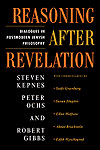 |
Reasoning After Revelation: Dialogues In Postmodern Jewish Philosophy
Steven Kepnes, Peter Ochs, Robert Gibbs
Postmodern Jewish thinkers understand their Jewishness differently, but they all share a fidelity to what they call
the “Torah” and to communal practices of reading and social action that have their bases in rabbinic interpretations of
biblical narrative, law, and belief. Thus, postmodern Jewish thinking is thinking about God, Jews, and the world—with
the texts of the Torah—in the company of fellow seekers and believers. It utilizes the tools of philosophy, but without
their modern premises. Moreover, this form of Jewish thinking provides resources for philosophically disciplined readings
of scripture by Jews, Christians, and Moslems seeking alternatives to the reductive discourses of secular academia,
on the one hand, and to antimodern religious fundamentalisms, on the other. Postmodern Jewish Philosophy aims to
utilize rabbinic modes of thinking to provide a model for ethical and religious thought in the twenty-first century,
one which moves beyond the dichotomy of relativism and imperialism and is simultaneously definite and pluralistic.
In Reasoning After Revelation: Dialogues in Postmodern Jewish Philosophy, three preeminent Jewish scholars debate the
form and meaning of Postmodern Jewish Philosophy after the failures of the great secular ideologies of modern western
civilization. Emulating the methods as well as the premises of Talmudic argumentation, the authors present their
responses as dialogues joined by a common love of the rabbinic tradition of commentary and interpretation of the Bible.
The composers, Peter Ochs, Robert Gibbs, and Steven Kepnes, contemplate where Judaism has been—and where it is headed:
on what basis will modern Jews now reason about the meaning of Jewish existence and the relevance of age-old
Biblical traditions to the moral and social crises of the twenty-first century? The dialogues are further enriched
by a set of responses from leading Jewish philosophers: Elliot R. Wolfson, Edith Wyschogrod, Almut Sh. Bruckstein,
Yudit Kornberg Greenberg, and Susan E. Shapiro.
ISBN: 081333506X (hardcover)
Borders/Amazon
ISBN: 0813365651 (paperback)
Barnes & Noble
Borders/Amazon

|
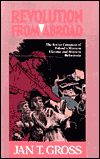 |
Revolution from Abroad: The Soviet Conquest of Poland's Western Ukraine and Western Belorussia
Jan T. Gross
Jan Gross describes the terrors of the Soviet occupation of the lands that made up eastern Poland between the two world wars:
the Western Ukraine and Western Belorussia. His lucid analysis of the revolution that came to Poland from abroad is based
on hundreds of first-hand accounts of the hardship, suffering, and social chaos that accompanied the Sovietization of this
poorest section of a poverty-stricken country. Woven into the author's exploration of events from the Soviet's
German-supported aggression against Poland in September of 1939 to Germany's attack on the Soviet Union in June 1941,
these testimonies not only illuminate his conclusions about the nature of totalitarianism but also make a powerful statement
of their own. Those who endured the imposition of Soviet rule and mass deportations to forced resettlement, labor camps, and
prisons of the Soviet Union are here allowed to speak for themselves, and they do so with grim effectiveness.
ISBN: 0691096031 (paperback)
Barnes & Noble
Borders/Amazon

|
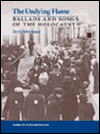 |
The Undying Flame: Ballads and Songs of the Holocaust
Jerry Silverman
A collection of 110 rare songs from the Holocaust era in 16 languages with singable English translations.
The lyrics, along with extensive historical notes and survivor testimonies, shed light on how the songs originated.
Contains illustratons, piano arrangements, lyrics and guitar chords.
The collection opens with a lengthy introduction which places the songs in their historical perspective.
ln addition, each of the songs is preceded by descriptive material - sometimes on a personal level supplied by survivors.
The book is divided into three main sections:
- The Gathering Storm: 1933 -1939, contains material from, pre-war German concentration camps, anti-Nazi songs
(particularly as related to the "Jewish question" in Germany, and other anti-Fascist songs, such as those arising
from the Spanish Civil War.
- Shoah: 1940 - 1945, is made up of songs inspired by the terrible events of the "Final Solution"-
including songs of the camps, ghettos aad resistance.
- Kaddish: A Post-War Retrospective, consists of post-war and contemporary songs reflecting on the Holocaust, by such composers as Pete Seeger,
Torn Paxton, Janis lan, Si Kahn, as well as European composers such as Mikis Theodorakis.
All the 110 songs are presented in their 16 original languages as well as with singable English translations.
There are over 300 pages of songs and text. The book is illustrated with never-before seen archival photos and drawings.
Accompanying CD includes 14 songs.
ISBN: 0815607083 (paperback)
Barnes & Noble
Borders/Amazon

|
|
|

